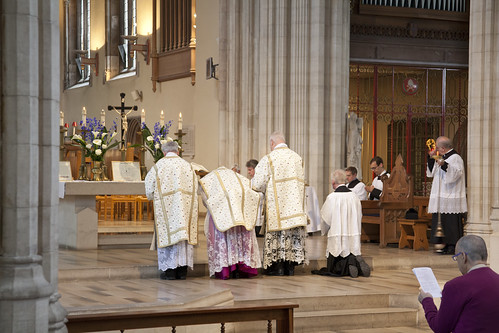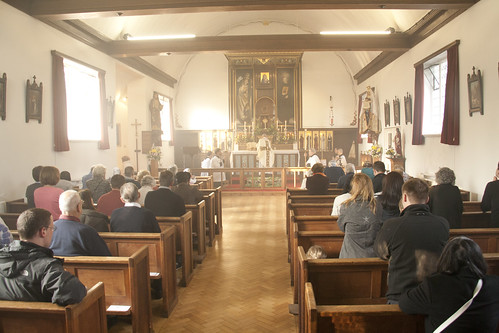 |
| A characteristic gesture of the Dominican Rite, at St Dominic's, Haverstock Hill, London. Archer's research centred around the Dominican parish in Newcastle. |
I've been reading Anthony Archer 'The Two Catholic Churches: a study in oppression' (SCM Press, 1986); it's a classic in the sociology of the English Catholic Chuch, and his treatment of the liturgical reform is sometimes cited in traddy books. It deserves to be better known, however, so here is a good long quote.
Archer, at the time a Dominican priest [see comment: he left the priesthood a couple of years after the book was published], was no traditionalist; he has complicated things to say about the Catholic working-class community and the social motivation (or pressures) which maintained it, which were declining for socioeconomic reasons in the 1960s and thereabouts. But his observations about the liturgical changes, larded with quotations from the scores of the older generation of Newcastle Catholics and former Catholics he interviewed, are acute.
 |
| Eloquent gesture: the celebrant confesses his sinfulness. The LMS AGM in St George's Southwark. |
From pp138-140. I've put his block quotations in double quote marks " ". The photos and their captions, of course, are mine.
If the old mass most noticeably provided a break from the mundane, it was also able to bear a great deal more than the new mass. No doubt this was partly due to the half-understood mutterings and gestures and silences – and its familiar shape for as long as anyone could remember:
“Whether it was the very fact that I couldn’t understand it, but it was much nicer. As I say you couldn’t see much of what was going on while the priest has his back to you, you couldn’t understand, but you somehow still enjoyed it…
“I couldn’t understand three parts of it, but I used to love to hear it. I could sit and listen to it and me mind was far way. I could imagine all these things when I was listening to the mass.”
 |
| The holy perceived through a mist of incense: Corpus Christi at SS Gregory & Augustine's, Oxford. |
 |
| Distant but meaningful mutterings: Low Mass at Prinknash Abbey |
“You’re more saddened with the Latin and I think requiems it should be done in Latin – on sad occasions, Good Friday, things like that.”
The mass did take place ‘in this vale of tears’ and it did incorporate the ambivalent hosts of angels and the looming statues and the dark corners of the church. It did know that black, however discordant with modern liturgical scholarship, was the human colour for funerals and that the Dies Irae, however pagan the words, was a genuine cry of anguish.
 |
| A window onto another world: Solemn Mass through the Rood Screen at St Birinus, Dorechester |
“Let me go back to when I was young, when it was all in Latin. To me in the Latin mass there was more devotion, when all your bells rang for communion and all this. I really used to feel straight away that God was there on the altar and I wouldn’t talk or turn or do anything. But now during an English mass it’s really, now I feel I could talk to Tessa or something if I felt I had to say something.”
The mass had lost its characteristic difference:
“If I went back I’d rather it’d been in Latin. Them just gabbing off in English now – there’s no feeling in the mass now. I liked to listen to the priest saying it and follow it in me old mass book rather than everyone together yapping away. It’s just killed the mass off. They’ve killed the feeling of the mass off. You could be anywhere – right in the middle of Land’s End.”
In this way the mass came to press in on the individual. Not only had it become in itself much less of a means of solemn withdrawal from the world. It no longer permitted individual withdrawal.
 |
| Communication with splendour: the Faithful are incensed at SS Peter & Paul & Philomena, New Brighton |
 |
| A sublime expression of human grief: a Solemn Requiem in St James', Spanish Place. |
Actually, Anthony Archer left the Dominicans and the priesthood about 25 years ago.
ReplyDelete'[the new Mass] no longer permitted individual withdrawal'. So true. This is all fascinating. The quotes from the Newcastle Catholics are very moving. Thanks for posting about this, it sounds like a very interesting book.
ReplyDeleteThe thing that gets me about it is how *boring* it is. So much so that it is tightly policed in Rome. If you go into a church in Rome during Mass time and you show any sign of praying in any way that is not in keeping with what everyone else is doing, say, going over to a side altar to venerate a saint or pull out your Rosary, the liturgy cop - usually just some guy appointed to the task by the priest... a sort of anti-usher - will come over and either try to force you to pray like everyone else or throw you out. Seriously.
ReplyDelete